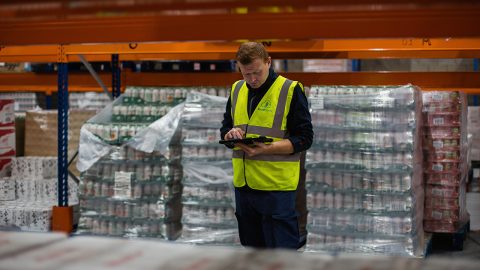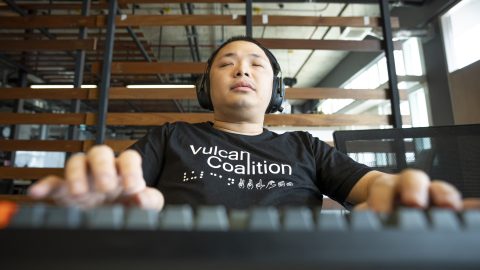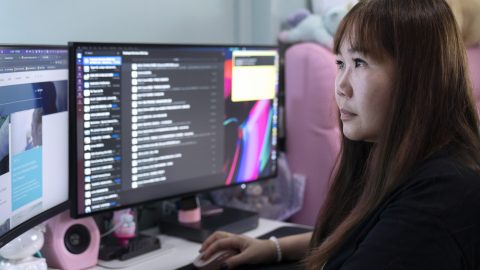How will company culture change when artificial intelligence clocks in?
At this year’s World Economic Forum in Davos, Switzerland, one of the hottest topics debated by attendees was artificial intelligence. AI is changing how we live. There isn’t a single industry that isn’t being transformed. So what does that mean for the future of work?
We sat in on a discussion featuring Jean-Philippe Courtois, Microsoft’s EVP and president of global sales, marketing and operations; Arjun Sethi, global lead of A.T. Kearney’s digital transformation practice; and Professor Herminia Ibarra, the Charles Handy Professor for Organizational Behavior at London Business School.
Afterwards, we caught up with them to talk more about how company culture and business leadership must adapt to ensure that AI brings value to all organizations.
Transform: Professor Ibarra, let’s start with you as this is your academic field. How will company culture change as AI becomes increasingly adopted? And what does cultural leadership look like in this new era?
Herminia Ibarra: Research shows that the productivity benefits of digital technologies like AI depend on the adopting firms’ ability to reorganize their core business processes around the new technology. This sort of transformation is more likely in cultures that promote experimentation, learning agility and a growth mind-set. Cultural leadership means enabling a shift from valuing being right, knowing the answers and cascading top-down changes to valuing dissent, asking questions and rapid iteration.
Transform: I’d like to turn to Jean-Philippe and Arjun. What do responsible business leaders need to do to ensure AI is effectively integrated and extends workforce capabilities?
Jean-Philippe Courtois: I’d like to start by saying that Microsoft’s vision for AI is first and foremost about people. It’s about amplifying human ingenuity through intelligent technology that will reason with, understand and interact with people. I know responsible business leaders will also think of AI in this context. So when AI is used this way, it will help us to solve some of society’s most fundamental challenges, and part of that problem-solving will come from using innovative tools that help us to do our jobs more effectively and efficiently.
Right now, we are seeing AI integrating with business in three keys ways: as conversational agents – commonly known as bots; intelligent apps; and by transforming business processes. So for business leaders, the focus is all about understanding how they can use AI to enhance their workforce’s capabilities. That’s obviously about long-term strategic business planning but we must also manage change on a human-to-human level. AI in the workplace will ‘amplify’ our activity but that activity will in some instances change and some people will need to learn new skills.
Successful digital transformation requires a big conversation on cultural leadership. So I believe above all, as business leaders we must be empathetic and help people to work through this.
Arjun Sethi: First and foremost, business leaders have a key responsibility to provide a balanced view of AI while making sure that their leadership teams and workforce at large understand that AI is no longer a term from a Sci-Fi movie but rather a business reality. Good leaders must demystify the term for their workforce. Absolutely, they should acknowledge that AI will lead to some reduction in repetitive and transactional tasks, but at the same time help employees understand the multiple ways in which AI will augment their roles and make many jobs easier to carry out.
Responsible leaders must also demonstrate that they are not just investing in the next shiny object but are also willing to make the investments necessary to upskill and retool their workforce in new technologies. That means getting them comfortable working with more intelligent machines and in data-rich environments.
Transform: What is your advice to a new generation of business leaders? How will AI impact their roles?
Ibarra: AI changes everything: how we craft strategy, plan, staff, hire and make decisions, to cite just a few of the things executives do. Because data is king in a world of AI, leaders will need to increasingly bridge across their organizational silos in order to obtain and leverage the data needed to fuel the AI system, and they will need to empower the people in the front lines who are better able to see the new business opportunities enabled by it. Above all, they will need to foster a culture of learning so that people are not afraid to tell them what they see and what they think.
Courtois: I absolutely agree. At Microsoft we’ve adopted a learning culture. We have stopped saying “I know everything” and moved to: “I am ready to learn everything.” Talking of empowerment, consider for one moment a truly data-driven organization. The ability to utilize information in real-time across the entire organization to make fluid business decisions, can be transformative to a company’s culture. Tolstoy said: “Everyone dreams of changing humanity; but nobody thinks of changing themselves.” Business leaders need to embrace the potential of AI.
Sethi: That’s a great quote! For me, future business leaders have to be technology and business leaders – these two words now go hand in hand. At A.T. Kearney, our research has found that for every four jobs that automation replaces, one new automation management role is created. Future CXOs need to be very well versed in the strategic potential of leveraging technology for business and competitive advantage. They will need to be equally conversant in working across organizational boundaries with a diverse set of partners and alliances and must be ready for disruptive trends at all times. Being nimble, agile and highly responsive to new and emerging competition will be key to their success.
Transform: We’ve talked about business leadership but let’s explore how AI can empower and engage a workforce. Can you expand on that?
Sethi: AI can result in a heavily engaged workforce the moment workers see the exponential increase in the impact they can have, due to enhancement and augmentation of their skills. Imagine the impact on a healthcare provider who can provide care to a patient hundreds of miles away, using remote-controlled devices and monitoring services. Similarly, picture a teacher who can now engage children in a developing economy, whilst they are still based at home in the US, or Europe.
Courtois: I talked earlier about our vision for AI is which is all about augmenting human ingenuity, so it’s important always to see things within that context, as Arjun also illustrates. I can share some examples of how this is being brought to life through our customers.
A great example is Thomson Reuters, the leading multinational mass media and information firm. It wanted to modernize customers’ web experience. So by using automatic video recommendations, Reuters dramatically increased the user engagement. You’re looking at 10-fold growth in the number of views and a 30 percent increase in viewing time per video, all while decreasing costs. Of course, it’s humans who create the videos but now they are being seen by more people and there’s data on what viewers respond best to.
Then there’s Jabil, one of the world’s leading design and manufacturing solution providers. It has built its predictive analytics solution on Microsoft Azure Machine Learning. The platform predicts errors or failures on the assembly floor before they occur, which saves time and money while delivering superior quality and shortened product lead times throughout the entire supply chain.
Or let’s look at WeChat, one of the most-used social apps in China, owned by Tencent. To eliminate the language barriers people face when communicating, Microsoft and Tencent worked together to integrate Microsoft Translator services into chats. Users can easily exchange messages in a host of languages and simply translate them at the touch of a button.
These examples deliver value to organizations in multiple ways but they also empower humans to apply themselves to things that only a human can do and to take businesses further.








